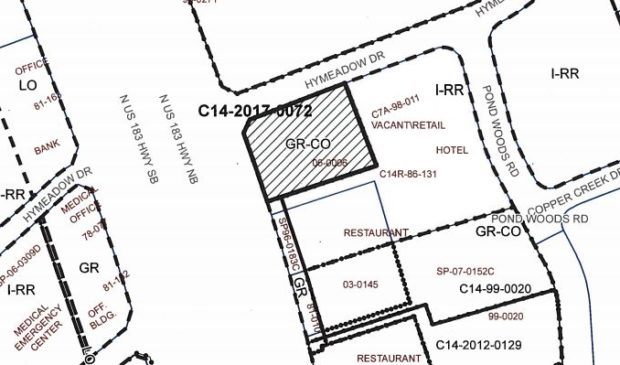Surprise vote ends liquor store zoning case
Friday, August 11, 2017 by
Jo Clifton With Mayor Steve Adler and Council Member Pio Renteria out of town, leaving just nine City Council members to vote at its meeting yesterday, the owner of the property at the intersection of Hymeadow Drive and U.S. Hwy 183 lost his bid to rezone the property to allow for a liquor store.
The vote was 5-4, but in order to move forward property owner Gary Ferguson would have needed six votes in favor. Members of a nearby neighborhood convinced Mayor Pro Tem Kathie Tovo and Council members Leslie Pool, Alison Alter and Ora Houston that the neighborhood would be worse off with another liquor store.
Linda Finley and Cathy Mandell told Council the neighborhood opposed the zoning change. Finley said the vacant building where the liquor store would be and the Crossland Economy Studios next door are a hot spot for crime. She said the location is the source of an average of 7.75 calls per month concerning crimes ranging from assaults to drugs and driving while intoxicated. There are also many families with children in the area and disturbances related to family disagreements, she said.
Adding another liquor store in the area would just make things worse, Finley and Mandell argued.
Staff recommended the zoning change for 12611 Hymeadow Drive from community commercial with a conditional overlay (GR-CO) to commercial, with liquor sales (CS-1). The Zoning and Platting Commission agreed but added its request for a conditional overlay that would prohibit adult oriented businesses, pawnshops, check cashing businesses and bail bond services. Ron Thrower, representing Ferguson, said his client had no problem with such a conditional overlay and pointed out that the property was already subject to a restrictive covenant prohibiting adult oriented uses.
Council Member Jimmy Flannigan, who represents that area, spoke in favor of the zoning change. But he said he was opposed to the conditional overlay proposed by the Zoning and Platting Commission. He called it “a perfect example of unnecessary conditional overlays” just like every other conditional overlay he had seen in his district. However, he lost that argument, with only Council Member Ellen Troxclair supporting his position.
“The concerns about the extended stay hotel are hard to hear, but it was not created by the liquor store,” Flannigan said. “There is no liquor store now. We did some research on this topic and while there does seem to be some academic backup for the concentration of liquor stores being somewhat of an attractive nuisance to a community, when we looked at what other cities do to mitigate that – they set a (minimum) distance between retail liquor stores.”
For example, he said Baltimore is proposing a minimum distance of 300 feet. One liquor store is about 1,800 feet from the proposed store on Hymeadow and another one is 3,000 feet from the proposed store, he said. Flannigan argued that the crime rate has more to do with “other economic factors” than it has to do with the presence or absence of a liquor store. In one particular instance, he said, the crime rate went down when a Spec’s was built in another part of his district.
After the vote, Tovo, who was chairing the meeting, then asked Jerry Rusthoven, assistant director of the Zoning and Planning Department, what would happen next. Rusthoven said without six votes the zoning change request was denied and the applicant could not seek a similar zoning change for 18 months.
Flannigan wanted to know whether they could reconsider their vote and who would have to make a motion for reconsideration and postponement so that Adler and Renteria could weigh in on the case. After a brief recess to consider the law, Assistant City Attorney Mitzi Cotton told Council that it could reconsider its vote on a motion by one of the four opponents of the zoning change. However, none of them volunteered to change sides.
After the vote, Tovo told the Austin Monitor via text that she was surprised by the outcome. “I did not realize the vote would be close, and certainly not close enough for the case to be denied. In retrospect, I am also surprised that the applicant did not ask for a postponement given that two members of the dais were absent, and the case had generated community opposition.”
The Austin Monitor’s work is made possible by donations from the community. Though our reporting covers donors from time to time, we are careful to keep business and editorial efforts separate while maintaining transparency. A complete list of donors is available here, and our code of ethics is explained here.
You're a community leader
And we’re honored you look to us for serious, in-depth news. You know a strong community needs local and dedicated watchdog reporting. We’re here for you and that won’t change. Now will you take the powerful next step and support our nonprofit news organization?







